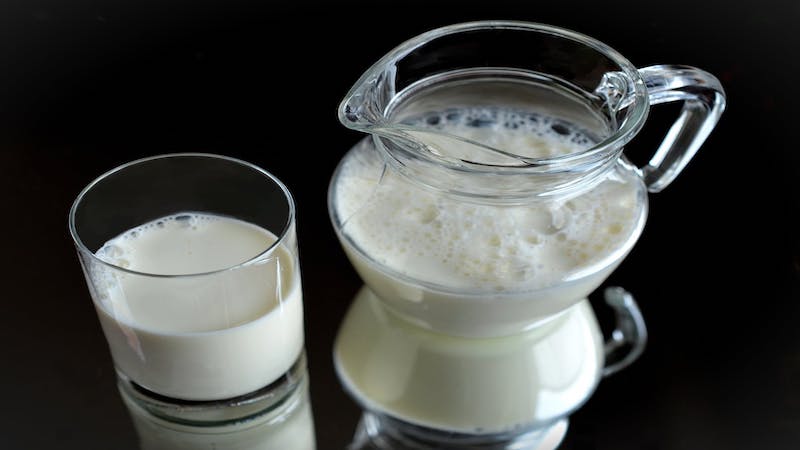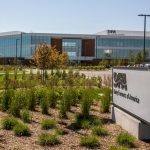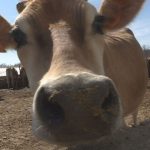
Abby Langer, a dietitian in Toronto, was one of the first health writers to take on the study. “I knew the story was inflated in terms of risk, and I wanted to put the real news out there before it caused any kind of hysteria.”
What Langer and others quickly discovered was that the headlines were reporting relative risk of developing breast cancer, which sets a much scarier tone than absolute risk. But more on that in a second. First, let’s break down what this observational study was all about.
Researchers from Loma Linda University investigated the association between soy, dairy and breast cancer risk, and the results were published in the International Journal of Epidemiology. The research was funded by the National Cancer Institute at the National Institutes of Health and the World Cancer Research Fund (WCRF), and it was not associated with any soy or dairy industry organizations.
The researchers used data from 52,795 women enrolled in the Adventist Health Study-2, which is a large cohort of North American Seventh-day Adventists. The average age was 57 (post-menopausal). This population was specifically chosen because many Adventists are vegetarian, which means researchers could study a large pool of people who enjoy dairy, soy or both. (The typical North American diet is much lower in soy compared with this population.)
At the beginning of the study, the women were asked about their dietary habits using a food frequency questionnaire. Researchers followed up almost eight years later and found that 1,057 participants reported a diagnosis of breast cancer, which is 2 percent of the study population. When looking back at the diet over the study period, the researchers found that women who consumed more dairy milk, but not cheese or yogurt, had a greater risk of breast cancer than the women who did not consume milk. They found no association between breast cancer risk and soy intake.
Now, back to those pesky numbers — relative risk and absolute risk. Relative risk measures the risk of a certain event happening in one group compared to another group. This study reported that drinking one cup of dairy milk daily was associated with a breast cancer risk of 50 percent, and drinking two to three cups per day increased a person’s risk by up to 80 percent compared to those women in the study drinking no milk over the same period of time. Does that mean if you drink a lot a milk, you have an 80 percent chance of developing breast cancer? Well, no.
Absolute risk paints a clearer picture. It measures the risk of a certain event actually happening at all. I asked for an explanation from Gary Fraser, an epidemiologist and professor at the Loma Linda University School of Public Health in California, and the first author on this study.
“The lifetime risk perspective of developing breast cancer for the average woman who drinks no dairy milk is about 8 or 9 percent,” Fraser says. “Those drinking at least two-thirds cup per day would have around a 13 percent lifetime risk.” That certainly helps with perspective. Remember, this study followed the women for eight years, not for their whole lifetime.
But it still seems like milk increases breast cancer risk by about 5 percent, right? That’s when it’s important to remember that this study was observational. That means it simply shows a possible association between two things, but it does not establish cause and effect.
“It’s too early to become alarmist,” Fraser says. “People like to be sensationalist, but one needs to bear in mind that this is one study, and it does not prove causation.” He explains that dairy milk may be linked to breast cancer, but the results in this case may also be attributable to some unknown factor the researchers have not identified yet.
“Our study suggests that something is going on here, but the exact interpretation of that requires more work,” Fraser says. “We’ve adjusted for a whole bunch of factors, but one always has to bear in mind that something else does exist, and that’s one of the weaknesses of observational studies.”
Kind of makes observational studies sound useless, doesn’t it? But here’s the thing: Not all health-diet relationships can be practically or ethically studied using the “gold standard” randomized controlled trials (which show cause and effect), so observational trials are still helpful to highlight patterns and indicate areas that need to be investigated further.
The researchers controlled for various known breast cancer risk factors, including family history, weight, alcohol use, activity level and reproductive history. But observational studies are imperfect, and they can’t control for everything. Plus, the dietary intake of the women was only recorded at the start of the study, and their intake of milk or other foods may have changed over the multiyear study period. It’s also interesting to note that the link between breast cancer and milk was not found in cheese and yogurt (which are made from milk!). This study raises interesting questions, but it certainly doesn’t have all of the answers.
The nonprofit WCRF publishes an expert report on the link between diet and cancer. Its 2018 report, Diet, Nutrition, Physical Activity and Cancer, says there’s limited evidence of a link between dairy and breast cancer, and the organization has not formed any recommendations around limiting dairy intake. Fraser says that although this study might push the WCRF to investigate the link more closely, he didn’t think it would be enough to convince the organization to change its recommendations.
“I would think that before the WCRF gets very specific about causation, they are going to need some more evidence regarding the mechanisms of how milk is linked to cancer,” Fraser says.
For context: In a 2018 meta-analysis of 13 studies on dairy products and risk of breast cancer, eight showed nonsignificant associations, three showed decreased risk of breast cancer with higher consumption of all dairy products, and two showed increased risk of breast cancer with higher consumption of milk. The research is a mixed bag for now.
So, if you’re a postmenopausal milk drinker, what should you do? It depends on whom you ask. Langer, the dietitian, says: “You can drink milk and be confident that there’s likely nothing going to happen. Diseases like breast cancer are multifactorial; you’re not going to get breast cancer just from drinking milk.”
Fraser, the researcher, advises a different approach. “Until there is more clarity, I would substitute cow’s milk with a plant-based milk alternative, since it’s pretty easy to do. The recommendations I make are more along the lines of ‘caution.’ If you’re at high risk of breast cancer, maybe take this advice more seriously.”
My advice? Although this study could lead to more paranoia about dairy foods, it shouldn’t. No single food causes (or cures) breast cancer, and your day-to-day dietary pattern (more whole foods, fewer ultra-processed foods) matters most. Perhaps the best thing you can do for your health is remember that nutrition research is always evolving, and you should never change your diet based on one observational study.
Registered dietitian Cara Rosenbloom is president of Words to Eat By, and specializes in writing, nutrition education and recipe development. She is the co-author of “Nourish: Whole Food Recipes Featuring Seeds, Nuts and Beans.”

























